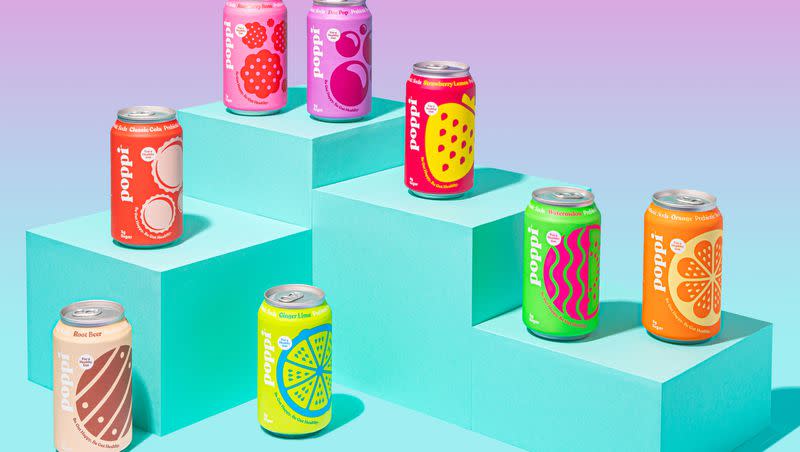Fizz without the guilt: Are healthy sodas worth it?

Since 2010, Americans have lowered their intake of soda each year, according to statistics by Statista. The average yearly amount of soda a person consumed in 2018 was 38.78 gallons compared to 45.5 gallons in 2010.
“Soda has no nutrients of value, and therefore, there is no nutritional benefit to having it,” said Kelly Kennedy, a staff nutritionist for Everyday Health. People continue to drink soda despite its negative health implications for several reasons.
The consumption of soda has many impactful health risks. According to UCLA health, “Sugary beverages like soda are linked to a long list of adverse health effects, starting with obesity, poor blood sugar control and diabetes. Recent studies have found an association with high blood pressure, high cholesterol and heart disease.”
Emphasizing that, “Having as little as one soda per day measurably increases the risk of developing Type 2 diabetes.”
Soda is heavily marketed and culturally ingrained as a common beverage choice for meals, celebrations and refreshment, making it an unquitable habit for many. The convenience factor also adds to the addiction, as soda is readily available and often cheaper than healthier drinks.
What are the healthiest sodas?
Getting rid of sugared-carbonated drinks altogether and sticking to water is obviously not a realistic solution, but transitioning to a healthier soda alternative could be. For those who find it challenging to completely eliminate soda from their diet, these soda drinks give a healthier alternatives while still curbing those soda cravings:
1. Olipop
“Although Olipop is a processed carbonated beverage product, it does contain prebiotics, fiber, and botanical extracts designed to help support gut health,” per Clean Eating Kitchen. “Compared to some of the more well-known and bigger brands of sodas, Olipop is lower in sugar and has natural ingredients.”
If you’re fond of the fizzy taste of soda, opting for Olipop is a wiser health decision. One can contains 2 to 5 grams of sugar and 45 calories.
According to the Olipop website, “The only Olipop flavors that currently contain caffeine are Vintage Cola, Cherry Cola and Dr. Goodwin, the rest are caffeine free. The caffeine in these three flavors consists of 50 milligrams of caffeine derived from green tea extract.”
Joanne Slavin, a professor of food science and nutrition at the University of Minnesota, and a member of the Olipops scientific advisory board, told The Washington Post that the soda’s fiber content alone makes it worth drinking.
“I’ve been telling people to eat more fiber. And, generally, fiber intake hasn’t moved at all over 40 years,” Slavin said.
But Olipop drinker Adrianna McCoy added that because of its high-fiber content, she wouldn't recommend more than one can a day, “Olipop is just a much more fun way of consuming fiber, as opposed to taking fiber vitamins or drinking Metamucil. ... “(But) I wouldn’t want a second Olipop. I feel like that’s a recipe for disaster.”
Related
2. Poppi
Another prebiotic soda that has grown in popularity is Poppi. Only two of Poppi’s nine flavors, Classic Cola and the Doc Pop, contain caffeine, with only 32 milligrams of caffeine in each can from green tea extract.
Amy Shapiro, a registered dietitian and the founder of Real Nutrition NYC, told Health that while soda alternative drinks are a healthier alternative than regular soda, their benefits are still exaggerated.
Shapiro said that one of Poppi’s main ingredients, apple cider vinegar, has no evidence showing it “improves gut health, it’s possible it ‘may help with blood sugar levels, prevent heartburn, and provide antioxidants,’”
Adding that drinking Poppi can’t replace a healthy diet, “If our diet is generally full of sugar, oils, fat and processed foods and lacks fiber, fruits, vegetables, whole grains, nuts, seeds, proteins and healthy fats, then just adding one item may not make a be a lifesaver or rescue device.”
The presence of additional health-oriented ingredients and the reduction of sugar make these sodas a better choice for those looking to reduce their sugar intake and avoid artificial additives while still enjoying a sweet, fizzy beverage.
However, while they are a healthier choice relative to traditional sodas, health advocates say they should still be consumed in moderation as part of a balanced diet.
